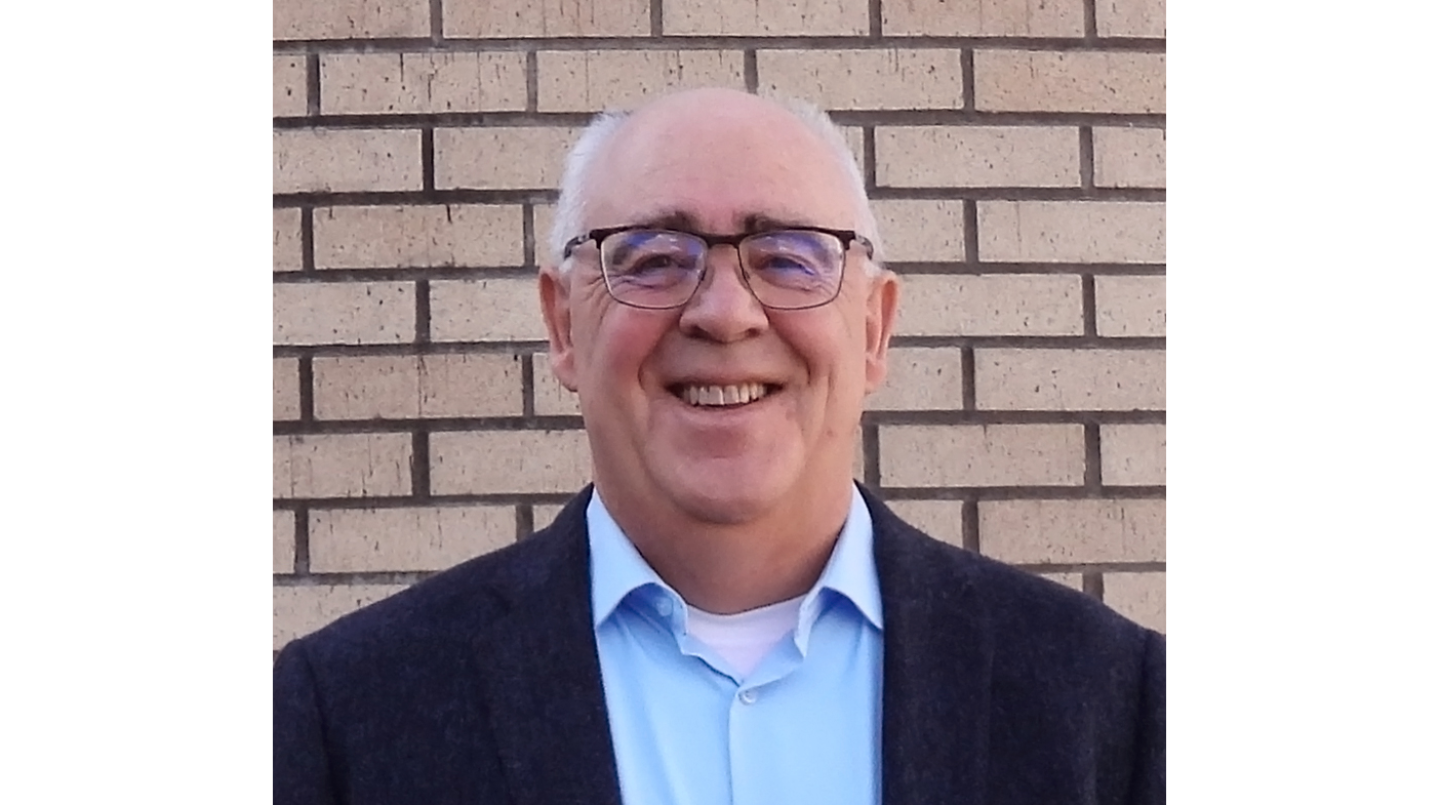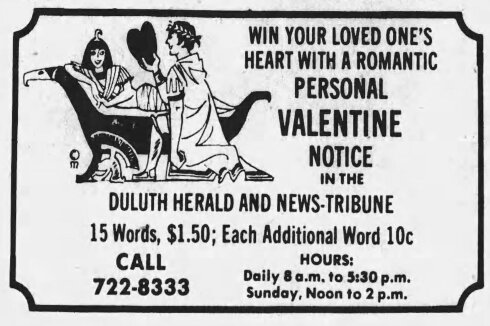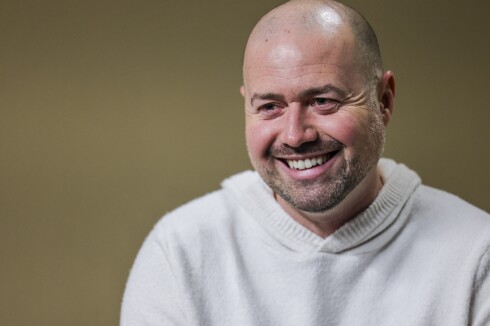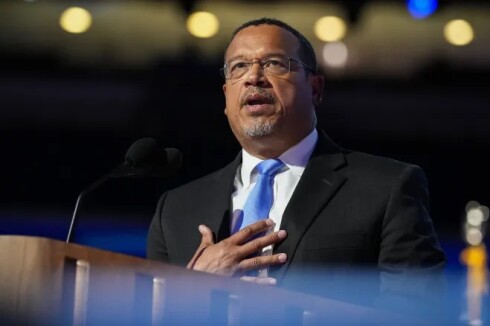DULUTH — For many residents, hopes of local police reform have turned to disappointment in recent years.
The push for change gathered steam in the wake of the May 25, 2020, death of George Floyd, a 46-year-old Black man, at the hands of the Minneapolis Police Department — an event that prompted protests around the world, including on the streets of Duluth.
ADVERTISEMENT
Duluth responded, in part, by conducting a comprehensive racial bias audit of local law enforcement at a cost of $273,465. While the 90-page report that resulted from the study offered several suggestions for ongoing improvement and reform, the document mostly appears to have gathered dust since its completion in 2023, according to Blair Powless, one of the many advocates involved in the initiative.
Powless said Mayor Emily Larson, who preceded Reinert as mayor, seemed genuinely interested in exploring possible police reforms. But in his opinion, that appetite for change diminished with Reinert’s election.
“My estimation of the current mayor is that he’s more Trumpian than anything else, frankly,” Powless said, reflecting on what he views as Reinert’s lackluster support for an ongoing review of police policies and behavior.
Unfortunately, we had a couple of big things happen. The election put a stop to a lot of things.
Reinert declined the News Tribune’s interview requests, referring questions instead to City Administrator David Montgomery, who said any follow-up delays in the wake of the racial bias audit should not be interpreted as a lack of commitment on the part of the new mayor’s administration.
“I can understand and appreciate that frustration,” he said. “But what I would tell them is: We made a terrific step forward. Just doing this audit, I think, was a large step forward.”
“Unfortunately, we had a couple of big things happen,” Montgomery said. “The election put a stop to a lot of things.”
In addition to a change of leadership, he noted the departure of Carl Crawford, Duluth’s human rights officer, as well as the mayor’s decision to replace City Attorney Rebecca St. George shortly after taking office.
ADVERTISEMENT
“It just was going to take a little time to get those positions replicated, and the critical one was the human rights officer,” Montgomery said.
Reinert recently named Marsha Lue, former president of the Duluth Human Rights Commission, as his pick to serve as Duluth’s next human rights officer, filling a post that had sat vacant for more than nine months. That appointment will head to the City Council next week for a confirmation vote.

Montgomery said that finding the right person for the job took longer than anyone had hoped but expressed confidence that Lue will prove worth the wait.
“Yes, I understand and am sympathetic to the concerns being raised about a loss of momentum. But we now have the pieces in place to reengage and to pick this up and to carry it forward,” he said. Lue was out of state and unavailable to comment for this story.
It feels as though the pendulum for change has now swung in the opposite direction, said Jamey Sharp, another local police accountability advocate who worked on the racial bias audit as a previous representative of the local NAACP chapter and the Law Enforcement Accountability Network.
“In some ways, it feels like we live in a world where George Floyd and all of the conversations and interest in equity, and interest in changing public safety, never even happened,” Sharp said, suggesting that many of the promises made and now seemingly “performative acts and speeches” delivered appear to have been for naught today.
While Minneapolis officials agreed on Jan. 6 to sign a consent decree, binding the department to deliver on police reforms, that agreement remains tied up in the courts following a police union challenge.
ADVERTISEMENT
Meanwhile, incoming President Donald Trump has been critical of consent decrees designed to address law enforcement concerns, calling them a “war on police” in the past. These views have raised questions about how actively the federal justice system under his administration will enforce such orders.
There is no consent decree in Duluth, as local Police Chief Mike Ceynowa is quick to note, pointing out that the two cities’ police departments are distinct and notably different from one another in their track records.
Nevertheless, Ceynowa said the death of Floyd brought community policing to the forefront as a concern across the nation. And he views the inward look it prompted in Duluth as a useful exercise.

“I think we are constantly looking internally at our organization and how we can serve the community of Duluth better as a police department, from how we approach certain situations to how we collect and utilize data so we can have targeted intelligence-led enforcement,” he said.
One of the most specific changes proposed in Duluth has been stymied.
The local NAACP held a news conference in November 2023 to unveil a draft policy that it hoped the Duluth Police Department would adopt to put an end to “pretextual” law enforcement stops, where individuals were stopped for minor infractions, such as a burnt-out license plate light, and then often were questioned on unrelated matters out of suspicion of their possible involvement in possible unlawful activity.
Sharp, who served as a co-chair on the NAACP’s criminal justice committee, said the proposed policy, which was the product of considerable negotiation with city officials, would have allowed for traffic stops for equipment violations only when there was “a direct threat to public safety.”
ADVERTISEMENT
Although Classie Dudley, president of the local NAACP chapter, could not be reached late last week, she noted at the time that such stops often lead to multiple fines and/or tickets for people who could least afford the cost.
“A pretextual stop, in my opinion, is a tax on the poor,” she told the News Tribune in November 2023.
But Ceynowa said the NAACP proposal never made it into the department's policy handbook due to language disagreements.
Regardless, he said the proposed policy change did prompt internal police department discussion about making traffic stops involving equipment and restricting them to situations where other “probable cause” factors might warrant an interaction anyhow.
“If we're going to make those, we need to have more information. We should be doing those because we have credible information that this person is involved in a criminal act beyond their equipment violation,” he said.
“Or if it is only an equipment violation, that is a short-duration stop to advise someone that, hey, you’ve got this issue. Just letting you know. Then, moving on,” Ceynowa said.
Non-white motorists are still over-represented in traffic stops by Duluth police.
ADVERTISEMENT
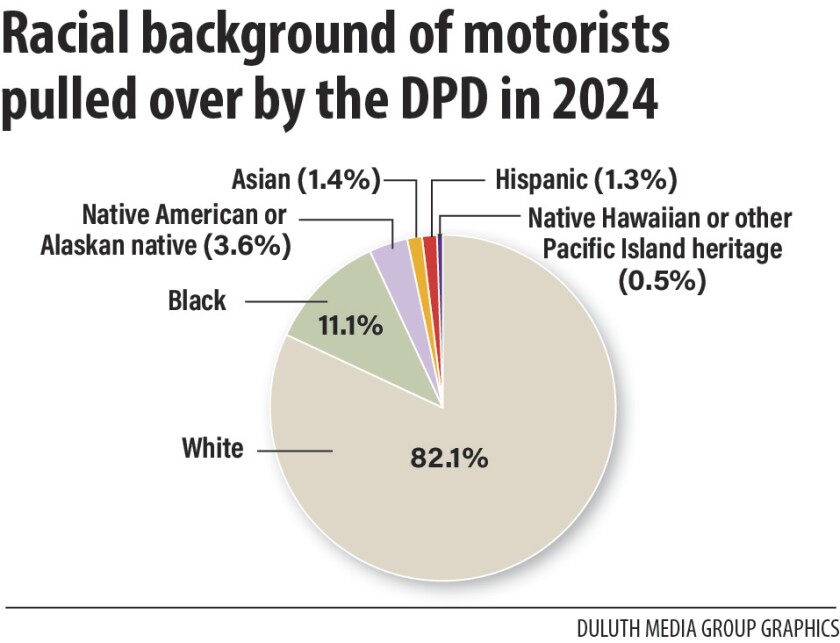
Stats for 2024 show that 82.1% of these stops involve white drivers, while they represent 87.9% of the local population.
By contrast, Census data shows Black people comprising 2.6% of the population yet accounting for 11.1% of local traffic stops. And people of American Indian or Alaskan Native heritage, who account for 1.5% of Duluth’s population, accounted for 3.6% of traffic stops.
Even more disconcerting is the latest use-of-force report, documenting Duluth police interactions in 2023. While it bears noting that police force was exercised in just 0.3% of responses, the suspects involved were:
- 47.7% white
- 31.1% Black
- 20.8% American Indian
- 0.4% Hispanic
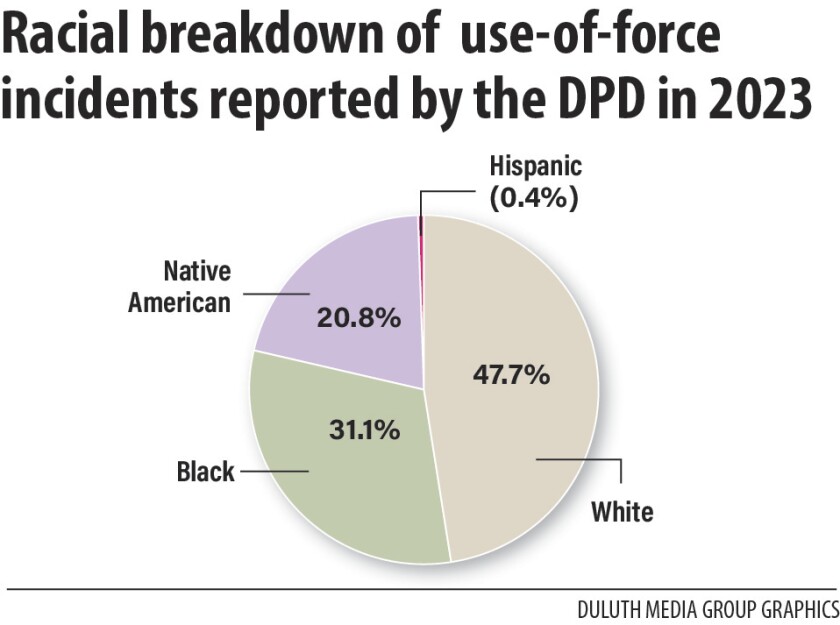
Sharp described those numbers as disheartening and upsetting.
“Use of force involves physically putting hands on someone, tackling them, hitting them, pulling a gun on someone, shooting them; it’s using a Taser on someone,” he said.
“We’re really talking about control of bodies, and often non-white bodies. It’s not a perception. It’s a reality,” Sharp said of the disproportionate use of force against minority populations.
Powless, too, said he finds the use-of-force statistics troubling.
ADVERTISEMENT
“On one hand, I just don’t want to believe that police are intentionally using force more often and more freely and resorting to that for reasons other than they have to,” Powless said. “But there’s definitely something going on there.”
Powless has served more than four years on a Citizens Review Board, set up to review police complaints. But he said the body suffers from a lack of staff support, and its membership dwindled from seven to two in early 2023, rendering it powerless to consider cases.
Reinert’s administration has since reappointed a full complement of members to the Citizens Review Board.
I don’t think we got nearly as much done as we had hoped or we would have liked to.
But Powless said he would still like the body to do more community outreach, neighborhood by neighborhood, to hear directly from citizens with police and safety concerns. This has been a difficult request to fulfill, however, without city support, he noted.
Powless said he felt a sense of urgency to make progress on police concerns in the wake of George Floyd’s death. He recalled thinking: “We’d better get on this because we have this moment, and it’s going to fade away.”
“And I feel like it has. I feel like we got some things done. But I don’t think we got nearly as much done as we had hoped or we would have liked to,” Powless said.
“If anything, I think that what happened with George Floyd’s death and the uprisings that occurred around that has at least made the police more cautious,” he said.
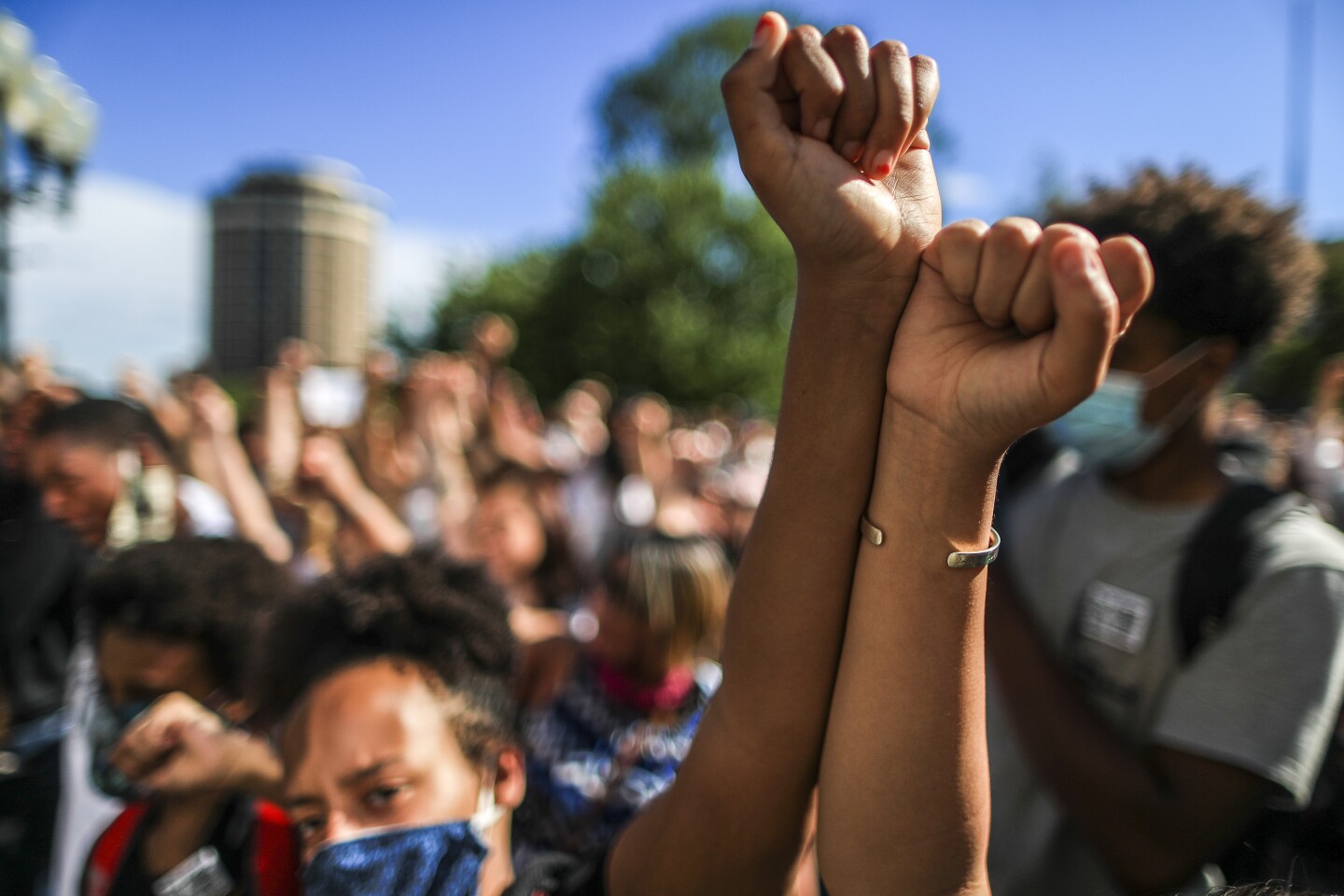
Sharp warned that Duluth runs a great risk if it doesn’t get its house in order regarding police reform, comparing the situation to a ticking alarm clock.
“Given the rate at which disparities occur in Duluth, a George Floyd-type event will eventually happen here,” he predicted. “It already probably has. But we haven’t had the perfect storm, where something ends up on the news.”
“That’s been the whole point of working together, because I don’t think the police department or the city wants that,” Sharp said.




